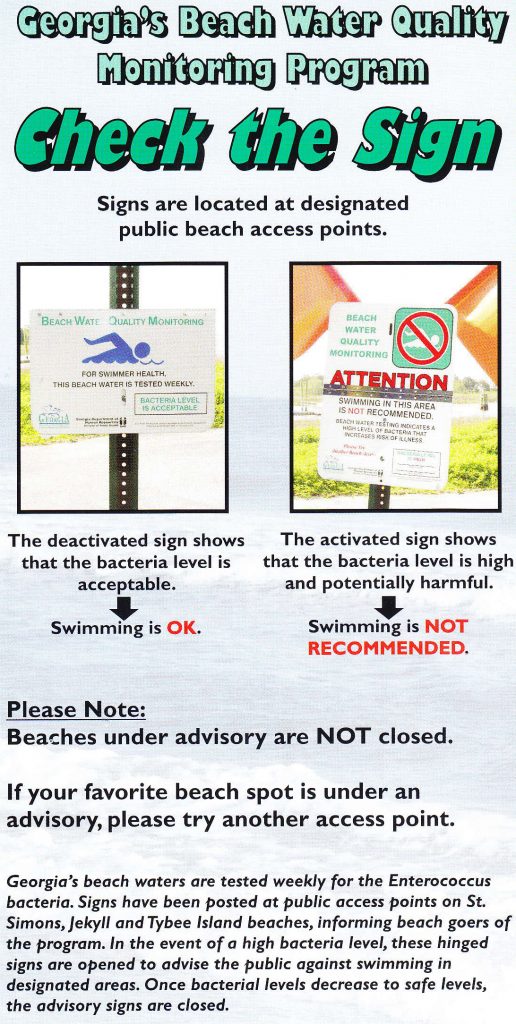Updated 12.22.20
The Glynn County Health Department has lifted the beach water advisories for Massengale Park Beach and South Beach at the lighthouse on St. Simons Island.
The advisories were issued on December 15, 2020 after routine water quality tests showed a high level of enterococci bacteria which increase the risk of gastrointestinal illness in swimmers.
Subsequent water samples showed that the bacteria levels had dropped below Environmental Protection Agency’s recommended limits. Therefore, the advisories have been lifted.
Updated 12.16.20
The Glynn County Health Department has issued water quality advisories for beach locations on St. Simons Islands.
The advisory locations are:
- Massengale Park Beach from Driftwood Drive to Cedar Street
- South Beach at the lighthouse from 9th Street to the pier
NOTE: The advisory for 5th Street Crossover Beach on St. Simons Island, from Cedar Street to 9th Street, was lifted on Wednesday, December 16th.
 These advisories are only for the areas specified above and do not impact the other beach areas on these islands. There is no way of knowing if going into water that is under advisory will result in illness. However, these beach water advisories are to alert the public of a possible risk of illness associated with water contact. An area under advisory does not mean the beach is closed.
These advisories are only for the areas specified above and do not impact the other beach areas on these islands. There is no way of knowing if going into water that is under advisory will result in illness. However, these beach water advisories are to alert the public of a possible risk of illness associated with water contact. An area under advisory does not mean the beach is closed.
Water samples are collected routinely on these islands throughout the year. The samples are tested for enterococcus (pronounced: en·ter·o·coc·cus) bacteria which is found in warm blooded animals including humans but also birds, raccoons, deer, dolphins and other wildlife. It is difficult to determine exactly where the bacteria come from, but some sources could include animal waste, storm water runoff, or boating waste. When a beach is under advisory, it means that the level of bacteria found in the water is above the Environmental Protection Agency’s recommended standards.
The Health Department recommends you do not swim or wade in the water in the area under advisory. Fish and other seafood caught from this area should be thoroughly washed with fresh water and thoroughly cooked before eating, as should fish or seafood caught from any waters.
The areas will be re-tested, and the advisories will be lifted when tests show the bacteria levels meet the Environmental Protection Agency’s recommended standards.
For more information, visit our Beach Water Testing Program page.




